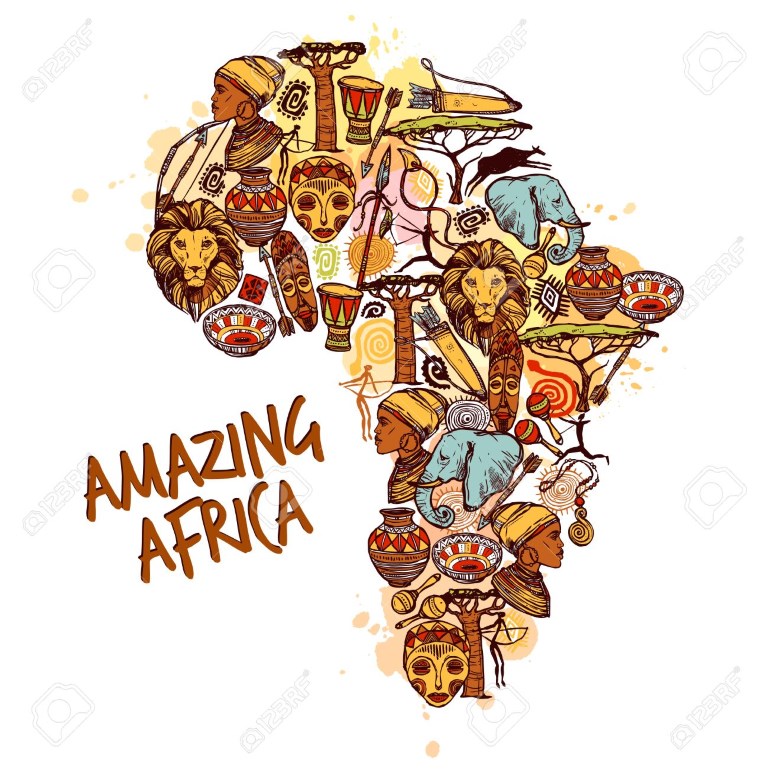Optimism About Africa’s Future
July 19, 2018 | Expert Insights

Despite solid economic growth and progress in poverty alleviation, people’s outlook on the African region remains polarised.
Background
Africa is the world's second largest and second most-populous continent after Asia. It is surrounded by the Mediterranean Sea, the Isthmus of Suez, the Red Sea, the Indian Ocean and the Atlantic Ocean. It contains 54 fully recognised sovereign states and several archipelagos. Africa hosts a large diversity of ethnicities, cultures and languages. The term Africa originates from the Western usage ‘Africa terra’, which means the land of the Afri, a tribe living in the northern part of Tunisia.
Scientists believe that Africa, particularly the central Eastern part, was the birthplace of mankind. By 100,000 BC modern humans lived by hunting and gathering with stone tools. Africa's written history starts with the rise of Egyptian civilization in the 4th millennium BC, and in succeeding centuries follows the development of many diverse societies. Understanding African history has been a challenge for researchers due to the scarcity of written sources in large parts of Sub-Saharan Africa.
In the late 19th century, European countries colonised almost all of Africa and most of its present states originated from a process of decolonisation in the 20th century. Modern African history has been rife with revolutions and wars as well as the growth of modern African economies and democratization across the continent.
Analysis
Hans Rosling was a Swedish physician and statistician who had worked as a district medical officer in Nacala, a remote part of northern Mozambique in the 1980s. The evidence of improvements 3 decades later convinced him that Mozambique was on the path of development that would lead to prosperity. He was a staunch critic of the “destiny instinct” – the idea that innate characteristics determine the destinies of people, countries, religions or cultures.
The destiny instinct, in a way, is a form of racism which attributes certain qualities to certain races. For instance, stating that Africans are inherently corrupt is an affirmation of the destiny instinct. Half a century ago, the sentiment was ripe for much of the Asian continent which was shortly disproven.
Mozambique had been devastated for more than 20 years after attaining independence in 1975. With a GDP per capita of $429 as of 2017, it is one of the poorest countries on earth. However, since 2000 life expectancy has risen while child mortality rates have fallen dramatically. Similar trends can be observed in many other African states.
Rosling had co-written a book with his son and daughter-in-law called Factfulness about the importance of monitoring steady progress: “Keep track of gradual improvements. A small change every year can translate to a huge change over decades.” Citing the example of China, he stated that people’s inability to log incremental change is what prevents them from understanding progress.
Across the African continent, governments have expended more effort into basic education. According to a UNESCO report, primary school enrolment has more than doubled to nearly 150 million between 1990 and 2012. Despite the absence of meaningful curriculum and teachers, today more children are in school than in the fields, setting the precedent for education.
Other trends on the continent have been moving in the right direction over the last decade. Per capita income, foreign investment, agricultural productivity, mobile banking, entrepreneurship and immunization rates are all rising. Poverty, armed conflicts, HIV and malaria are on the decline. According to the UN human development index, 15 African countries have attained medium to very high human development. According to the World Economic Forum’s global gender gap index 2014, Rwanda now ranks among the top 10 most gender equal societies in the world, in terms of economic and political participation.
Counterpoint
Many scholars state that a brutal colonial experience has left African states too fragile to foster development. Within individual countries there are differences in performances across rural and urban sectors. In the global context, the continent is subject to forces beyond its direct control, such as plunges in global oil prices.
Assessment
Our assessment is that there are abundant opportunities for development in Africa. We believe that research must systematically assess the combined effects of Africa’s population growth, expanding resource needs, environmental degradation and climate change. We feel that Africans need to build on their rich cultural heritage to confront the difficult and complex intergenerational decisions that they face.








Comments